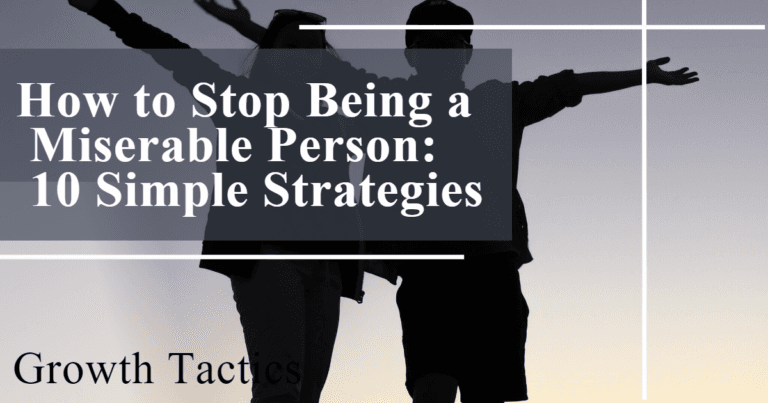Are you tired of feeling unhappy and emotionally drained? Do you often wonder why joy seems to elude you while others appear content? Misery can creep into your life in many ways, but the good news is, you have the power to change it.
In this article, we’ll offer simple and effective strategies to help you break free from misery and step into a life filled with happiness and fulfillment. Start your journey towards a brighter, more meaningful existence today!
Jump To Section
Understanding Misery
Let’s start by understanding what misery really is. Misery isn’t just about having a bad day now and then; it’s a deeper, more constant feeling of unhappiness and emotional drain. When you feel miserable, it often seems like there’s a dark cloud hanging over you all the time. This can make even simple activities feel overwhelming and joyless.
What Does Misery Look Like?
Misery has a few telltale signs. You might feel:
- Constantly Unhappy: It’s hard to remember the last time you genuinely felt happy or at peace.
- Chronically Sad: Sadness feels like a daily companion that never leaves your side.
- Stressed Out: Everything feels harder and more stressful than it should.
- Lack of Motivation: Tasks that used to excite you now feel like a burden.
- Social Withdrawal: You avoid social interactions because they seem draining.
- Fatigue: You feel tired all the time, no matter how much you rest.
- Increased Irritability: Little things set you off more than they used to.
- Negative Self-Talk: You often find yourself thinking negatively about yourself and your situation.
Why Do We Feel Miserable?
There are several things that can make us feel this way:
- Unmet Expectations: When things don’t go the way we expect, it can lead to a lot of disappointment and frustration.
- Negative Habits: Sometimes, we get stuck in patterns of thinking and behavior that keep us feeling down.
- Poor Relationships: Lacking meaningful connections or struggling in existing relationships can seriously affect our mood and overall happiness.
- Chronic Stress: Long-term stress from work or personal life can take a toll on our mental well-being.
- Health Issues: Both physical and mental health problems can contribute significantly to feelings of misery.
- Financial Troubles: Constant worry about money and financial security can cause persistent distress.
- Lack of Purpose: Feeling like your life lacks direction or meaning can contribute to ongoing unhappiness.
- Past Trauma: Unresolved issues and past traumas can continue to affect your mental state.
Understanding these root causes is the first step towards breaking free from the cycle of misery. Once we know what’s dragging us down, we can start to introduce positive changes that will lift us up. Stay tuned, because in the next sections, we’ll dive into how you can turn things around and start living a happier, more fulfilling life.
10 Strategies to Stop Being Miserable
Feeling miserable can make even the smallest tasks seem insurmountable. It’s important to remember that you don’t have to stay stuck in this cycle. Here are ten practical strategies to help you shift from misery to a happier, more fulfilling life.
1. Identify What’s Wrong
The first step to solving a problem is identifying it. Take some time to figure out what’s making you feel so down. Is it your job? Your relationships? Your health? Understanding the root cause will help you take more targeted action.
Action Tip: Write down what’s bothering you in a journal. Break it down into categories like work, health, and relationships.
2. Practice Gratitude
Focus on the positives in your life. At the end of each day, write down three things you’re grateful for. This simple exercise can help shift your mindset from negative to positive.
Action Tip: Keep a gratitude journal by your bedside and make it a habit to jot down three things you’re thankful for every night.
3. Get Moving
Exercise has a powerful impact on your mood. Whether it’s a brisk walk, a run, or a yoga session, getting your body moving can help release endorphins, which are natural mood lifters.
Action Tip: Commit to 20 minutes of physical activity every day. It could be a walk, a dance session, or any form of exercise you enjoy.
4. Connect with Others
Loneliness can amplify feelings of misery. Reach out to friends or family members. Even a short chat can help you feel more connected and less alone.
Action Tip: Schedule regular catch-up calls or video chats with friends and family.
5. Set Small, Achievable Goals
Big goals can be overwhelming, especially when you’re not feeling great. Start by setting small, manageable goals. Achieving them can give you a sense of accomplishment and motivate you to keep going.
Action Tip: Break larger goals into smaller tasks. For example, instead of “clean the house,” start with “tidy up the living room.”
6. Limit Social Media
Constantly comparing your life to others on social media can make you feel worse. Take a break from scrolling and focus on your own journey. Limit your social media use and see how it impacts your mood.
Action Tip: Set a timer for your social media usage and stick to it. Try using apps that track and limit your screen time.
7. Seek Professional Help
If your feelings of misery are long-lasting and deeply affecting your life, consider seeking help from a therapist. Talking to a professional can provide you with tools and strategies to cope better.
Action Tip: Look for therapists in your area or consider online therapy options. Schedule an initial consultation to find someone you’re comfortable with.
8. Develop a Routine
A structured routine can bring a sense of normalcy and control. Make a daily schedule that includes time for work, exercise, relaxation, and socializing. Sticking to it can help improve your overall well-being.
Action Tip: Plan your day the night before. Write down a simple schedule and try to follow it as closely as possible.
9. Practice Mindfulness
Being present in the moment without judgment can reduce anxiety and stress. Try mindfulness techniques like deep breathing, meditation, or simply paying close attention to what you’re doing right now.
Action Tip: Set aside 5-10 minutes each day for a mindfulness exercise. You can use apps or online videos to guide you.
10. Do Something You Enjoy
Engage in activities that bring you joy, whether it’s reading a book, cooking, painting, or playing a sport. Doing things you love can distract you from negative thoughts and elevate your mood.
Action Tip: Make a list of activities you enjoy and schedule time for at least one of them each week.
Implementing these strategies won’t magically erase all your problems, but they can help you carve out a path toward a happier, more fulfilling life. Start small, be consistent, and most importantly, be kind to yourself during this journey. You’ve got this!
Finding Meaning and Purpose
Finding meaning and purpose isn’t just for philosophers or people on a spiritual quest. It’s about understanding what makes you tick and what brings you joy and fulfillment. It’s about figuring out what you love to do and what makes your life feel good. So, how do you find it? Let’s break it down together.
1. Discover What You Love
The first step to finding purpose is to identify what you love to do. Think about the activities that make you lose track of time because you’re so engaged. It could be anything from painting, writing, helping others, or even cooking a delicious meal.
2. Explore Your Talents
Everyone has something they’re good at. What are your strengths? Maybe you’re an excellent listener, a talented musician, or you have a knack for solving problems. Your talents can often point you toward your purpose.
3. Reflect on What Matters Most to You
Think about your values and what’s important to you. Is it family, creativity, learning, or helping others? Understanding your core values can guide your decisions and help you live a life that feels meaningful.
4. Look at Your Past Experiences
Sometimes your past can give you clues about your purpose. Look back at your life and think about the moments that felt particularly meaningful or rewarding. What were you doing? Who were you with? What needs were you meeting at that time?
5. Set Goals That Inspire You
Meaning and purpose often come from setting and working toward inspiring goals. These goals don’t have to be huge. They just need to be something that excites you and gives you a sense of direction.
6. Connect with Like-Minded People
Surrounding yourself with people who share your interests and values can help you stay motivated and inspired. Plus, they can offer support and guidance when you need it.
7. Be Patient with Yourself
Finding meaning and purpose is a journey, not a destination. It’s okay if you don’t have everything figured out right away. Give yourself time to explore and discover what truly makes you happy.
By trying some of these tips, you’re beginning a journey toward a more meaningful and purposeful life. Remember, it’s not about making huge changes overnight. It’s about taking small, consistent steps that lead you toward a life that feels right for you. Enjoy the journey, and trust that you’ll find your way!
Conclusion
Finding meaning and purpose in life can seem like a big task, but remember, it’s all about taking small steps. By exploring what you love, identifying your strengths, reflecting on what matters, and setting inspiring goals, you’ll gradually discover what makes your life fulfilling.
Start today. Think about one small change you can make that aligns with your passions and values. Maybe it’s as simple as dedicating an hour a week to a hobby you love or reaching out to someone who inspires you.
Yes, the journey might feel challenging at times. There will be ups and downs. But every step you take brings you closer to a life that’s rich with meaning and joy. And trust me, it’s entirely worth it.
So, go ahead and take that first step today. Your future self will thank you. Happy journeying!


